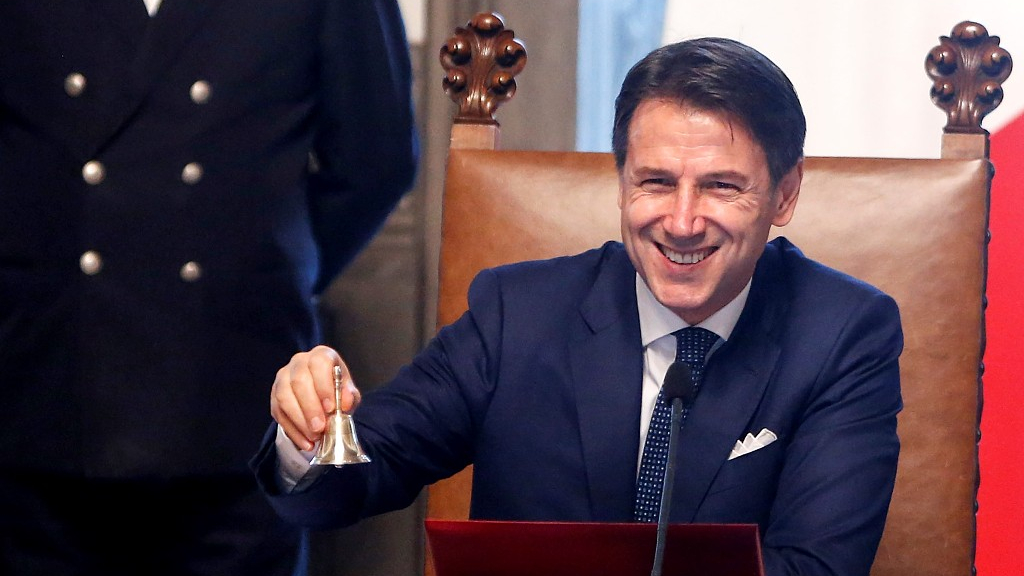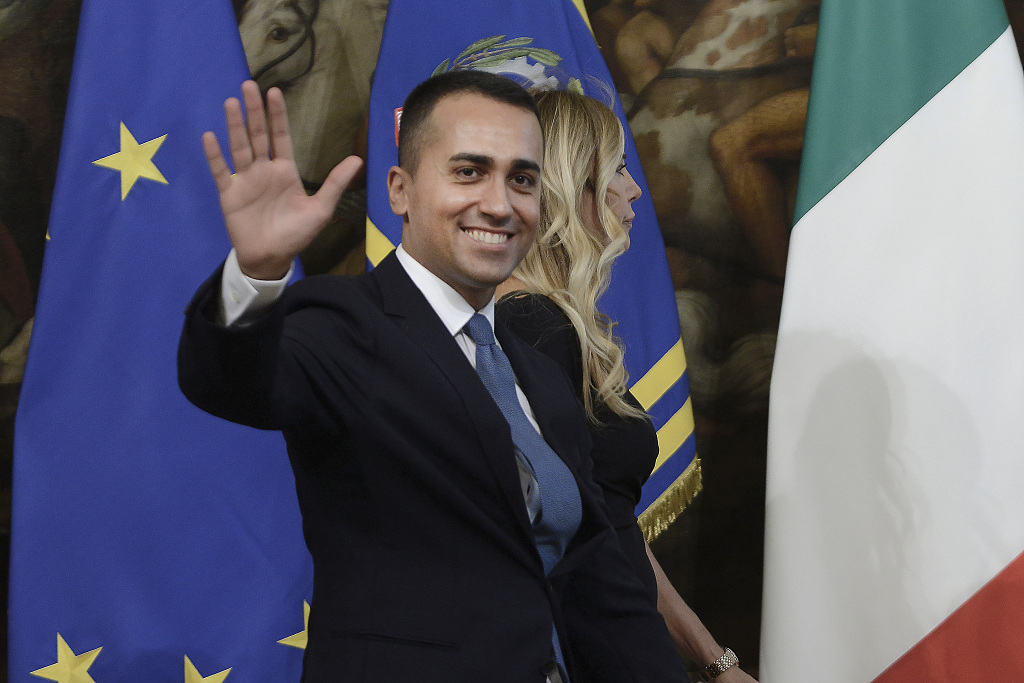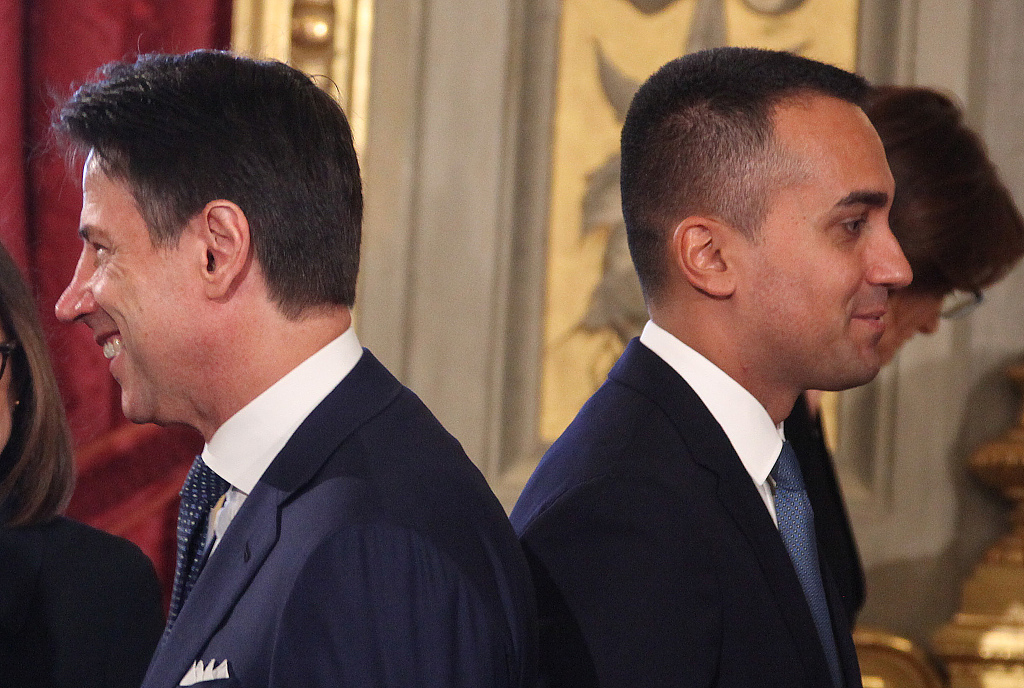

Editor's Note: Matteo Giovannini is a finance professional at ICBC in Beijing and a member of the China Task Force at the Italian Ministry of Economic Development. The article reflects the author's opinions, and not necessarily the views of CGTN.
On September 5, the Italian ministers representing the new coalition formed by the Democratic Party and the Five Star Movement were formally swore in. This has officially started the 67th government of Italy since the end of World War II.
The new government, even before starting its work, has received positive feedback from the markets with stock exchanges indexes and bonds' spread at levels never seen before in the last decade. This is due to the strong confidence that markets and political elites have in the established parties.
The cabinet led by Giuseppe Conte has been immediately viewed as a guarantor of stability from international partners. The coalition has also made it clear that Italy will be pro-EU and pro-euro and will work proactively to reduce its deficit and cooperate on immigration issues affecting all the European countries.
This is a strong contrast to the Lega party that proposed to take the country out of the EU, out of the euro, lower taxes with a risky increase in deficit well beyond EU parameters of stability, and not respect cooperation on managing immigration as agreed by other European countries.
It is not surprising from this point of view that the EU has promptly decided to reward Italy for this change with an important seat as an EU Commissioner to the former Prime Minister Paolo Gentiloni. The appointment certainly puts Italy at the center of the European Union.
What is not clear until now is the kind of foreign policy Italy wants to assume towards China. The coalition government has declared to believe in multilateralism. The appointment of Luigi Di Maio, the political leader who believed from the very beginning in the Belt & Road Initiative (BRI), as a minister of Foreign Affairs, is a direct message to the stakeholders.

Luigi Di Maio, Italy's new Minister of Foreign Affairs. /VCG Photo
Despite this, probably the most assuring breaking news that came from Italy at the end of last week was the surprising appointment of the current Italian ambassador to China, Ettore Sequi, as the chief of staff to Luigi Di Maio. Ettore Sequi, who has been ambassador to China since his appointment in 2015, was due to complete his mandate in 2020. The decision to call him back to Rome is the clearest message to the world on how Italy wants to direct its foreign policy.
Ettore Sequi has been praised by both Italian and foreign delegates for his efforts to build a constructive relationship with China. He built up the relationship and the framework that eventually led the Italian government to sign a Memorandum of Understanding with China, making Italy the first G7 country to formally support the BRI. He also facilitated the participation of Italy's prime minister to the Second Belt and Road Forum for International Cooperation held in Beijing on April 2019.
Moreover, Sequi is the person who formally led and implemented the China Task Force, an initiative that represents a mechanism of cooperation and dialogue between governments, businesses, and societies for developing a new national strategy aimed at strengthening Italy's economic and trade relationships with China.
The appointment of Ettore Sequi, a real man of action, as chief of staff to the minister of foreign affairs would certainly be welcomed by the Italian community in China that has been working hard on building a bridge between the two countries.

Prime Minister Giuseppe Conte (L) and Foreign Minister Luigi Di Maio (C) are set to bring Italy and China closer. /VCG Photo
The appointment would also be welcomed by China since Ettore Sequi has gained a good reputation among Chinese leaders for his activity and diplomatic skills. Unlike other politicians in Rome, he once lived in China, gained experience in the field, and created a strong network of connections with the business community. This has given him an edge in understanding the needs of Italian entrepreneurs doing business with China. He also represents a guarantor of the commitment of Italy to China and the development of a prosperous political and commercial tie.
A more open-to-dialogue and multilateral Italy would certainly be welcomed by not only EU countries and China, but also by other countries in the world.
Africa is a close neighbor and the participation of Italy in the BRI can be strategic in terms of investments in third countries. Participating in the construction of infrastructures in Africa could benefit the local population by increasing their standard of living.
Conte, during the last G7 meeting in France, has also supported the idea of extending the membership to Russia to form a G8.
Summer 2019 is definitely going to be remembered as the season when Italy shifted from its self-injury approach towards isolationism to a more open and multilateral attitude. Having in mind the history of Italy, it is now highly desirable that this government is able to govern for the benefit of the country and the rest of the world.
(If you want to contribute and have specific expertise, please contact us at opinions@cgtn.com.)

Copyright © 2018 CGTN. Beijing ICP prepared NO.16065310-3
Copyright © 2018 CGTN. Beijing ICP prepared NO.16065310-3